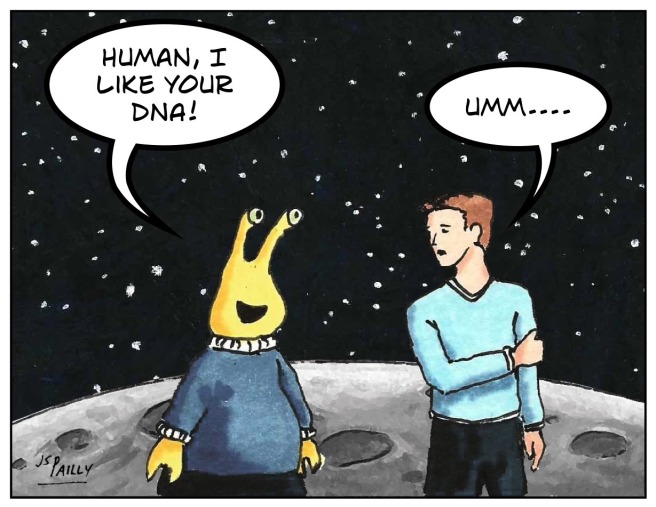
Today’s post is part of a special series here on Planet Pailly called Sciency Words. Each week, we take a closer look at an interesting science or science-related term to help us all expand our scientific vocabularies together. Today’s term is:
BACTERIAL CONJUGATION
Bacteria aren’t like us. They’re not stuck with the DNA they’re born with.

Through a process called bacterial conjugation, one bacterium can donate some of its genes to another. In some cases, this even works between bacteria of different species.
The process begins with something called an “F plasmoid” or “F factor.” Bacterial conjugation has a few things in common with sexual reproduction, so I’m sure you can guess what the F stands for. It stands for fertility. Obviously.
This F plasmoid is actually a strand of DNA looped into a circle. A bacterium that has an F plasmoid is called an F+ cell. A bacterium that doesn’t have it is an F- cell. And when an F+ cell and an F- cell meet, the real fun begins.
- Step One: The F+ cell grows a hair-like protrusion called a pilus (plural pili).
- Step Two: The pilus attaches to the F- cell, and a connection is formed. You could think of the pilus as a tiny straw linking one bacterial cell to the other.
- Step Three: Within the F+ cell, the F plasmoid splits apart right down the center of its double helix structure, like a zipper unzipping. One half is fed through the pilus, and the other half stays put.
- Step Four: Using the half-strand of DNA as a guide, the F- cell creates a complimentary strand of DNA and zips the two back together. The F+ cell does the same thing with the half-strand that it kept. Now both bacteria have a full copy of the F plasmoid, meaning both are F+ cells, and both can go spread the F plasmoid to other bacteria.
This ability has proven to be really useful for bacteria. It is, for example, one of the mechanisms that spreads immunity to our anti-bacterial drugs.
It’s too bad humans can’t do this, but transferring DNA between multicellular organisms would be a far more complicated matter (though come to think of it, sperm and egg cells do an okay job). But perhaps on some distant alien world, multicellular conjugation is possible. Perhaps it is common even between different species. Maybe some day we’ll meet these conjugating life forms, and awkward conversations will ensue.

This is fascinating. When you think about it, both bacteria and complex life bodies are vehicles to secure replication of DNA molecules. It sounds like bacteria DNA has figured out a way to replicate outside of the bacteria’s reproduction.
But I suspect complex life sharing DNA might also be a problem because it might introduce instability and/or possibly trigger immune system reactions.
LikeLiked by 1 person
Good things to think about. I’m actually considering developing an alien species that can do this on a multicellular level.
LikeLiked by 1 person
Sounds like it would be a pretty cool species.
LikeLiked by 1 person
I sure hope so.
LikeLiked by 1 person
I suppose an alien multicellular organism could have a “master” cell that could accept DNA changes, then propagate them to its other cells.
If I remember correctly, bacteria even have the ability to take in DNA from other bacteria that are dead. I think there was a famous experiment demonstrating this.
LikeLiked by 1 person
I just looked that up, and you’re right. Bacteria can take DNA from dead cells, even from organisms that have been dead for thousands of years. Which makes a certain sense. DNA is just a molecule, after all.
LikeLike
I heard something on NPR recently that reminded me of this post. The narrative said that said life, before 3 billion years ago, shared DNA with each other much more liberally, to the extent that “species” as we currently understand the term didn’t exist. About 3 billion years ago, life forms started getting choosy about who they’d accept DNA from. It apparently was a major evolutionary milestone.
I only heard part of the story and have been meaning to lookup and listen to the whole thing. (I think it was on Science Friday.)
LikeLiked by 1 person
I’ll have to check that out. This bacterial DNA party just keeps getting wilder and wilder.
LikeLiked by 1 person